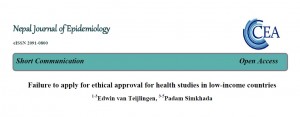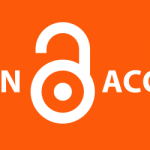 As it is Open Access Week I would like to clarify one of the Open Access publishing myths. One of the common replies I receive from academics colleagues when raising Open Access publishing is that it is (too) expensive. This is, of course, true for many academic journals, but not all are expensive. Some don’t even charge a processing fee at all. Infamously, The Lancet Global Health charges an article processing fee of US $4750 upon acceptance of submitted research articles. More moderately priced scientific journals still charge anything up to about £1,500 per article.
As it is Open Access Week I would like to clarify one of the Open Access publishing myths. One of the common replies I receive from academics colleagues when raising Open Access publishing is that it is (too) expensive. This is, of course, true for many academic journals, but not all are expensive. Some don’t even charge a processing fee at all. Infamously, The Lancet Global Health charges an article processing fee of US $4750 upon acceptance of submitted research articles. More moderately priced scientific journals still charge anything up to about £1,500 per article.
 Academic publishing has been big business for decades, and Open Access has rapidly become part of that business. While traditional book and magazine publishers struggle to stay afloat, research publishing houses have typical profit margins of nearly 40%, according CBCNEWS who quote Vincent Larivière from the University of Montreal’s School of Library & Information Science.
Academic publishing has been big business for decades, and Open Access has rapidly become part of that business. While traditional book and magazine publishers struggle to stay afloat, research publishing houses have typical profit margins of nearly 40%, according CBCNEWS who quote Vincent Larivière from the University of Montreal’s School of Library & Information Science.
At the same time we see a sharp increase in so-called Predatory Publishers who have set up business for the sole reason to make money from Open Access publishing. They have not established or taken over academic journal for the greater good of the discipline or the dissemination of research findings to the widest possible audience. Unscrupulous publishers jump on the Open-Access bandwagon BU librarian Jean Harris recently shared an interesting article about Predatory Publishers (click here to read this!).
![]() However, there are other format of Open Access. One of our more recent papers on research ethics was published in the Nepal Journal of Epidemiology which is an online Open Access journal that does not charge authors for publishing! Also the Journal of Asian Midwives, where FHSS PhD student Preeti Mahato recently had her article accepted, is hosted in Pakistan by Aga Khan University through its institutional repository eCommons. Publishing in this Open Access online journal is also free of charge. In other words, Open Access publishing does not have to be expensive!
However, there are other format of Open Access. One of our more recent papers on research ethics was published in the Nepal Journal of Epidemiology which is an online Open Access journal that does not charge authors for publishing! Also the Journal of Asian Midwives, where FHSS PhD student Preeti Mahato recently had her article accepted, is hosted in Pakistan by Aga Khan University through its institutional repository eCommons. Publishing in this Open Access online journal is also free of charge. In other words, Open Access publishing does not have to be expensive!
Prof. Edwin van Teijlingen
CMMPH
 New blog on Open Access publishing
New blog on Open Access publishing










 New CMWH paper on maternity care
New CMWH paper on maternity care From Sustainable Research to Sustainable Research Lives: Reflections from the SPROUT Network Event
From Sustainable Research to Sustainable Research Lives: Reflections from the SPROUT Network Event REF Code of Practice consultation is open!
REF Code of Practice consultation is open! ECR Funding Open Call: Research Culture & Community Grant – Apply now
ECR Funding Open Call: Research Culture & Community Grant – Apply now ECR Funding Open Call: Research Culture & Community Grant – Application Deadline Friday 12 December
ECR Funding Open Call: Research Culture & Community Grant – Application Deadline Friday 12 December MSCA Postdoctoral Fellowships 2025 Call
MSCA Postdoctoral Fellowships 2025 Call ERC Advanced Grant 2025 Webinar
ERC Advanced Grant 2025 Webinar Update on UKRO services
Update on UKRO services European research project exploring use of ‘virtual twins’ to better manage metabolic associated fatty liver disease
European research project exploring use of ‘virtual twins’ to better manage metabolic associated fatty liver disease
The heart of the matter is in knowing the answer to this question :
Does those free-to-publish journals have a solid peer review system in place ?